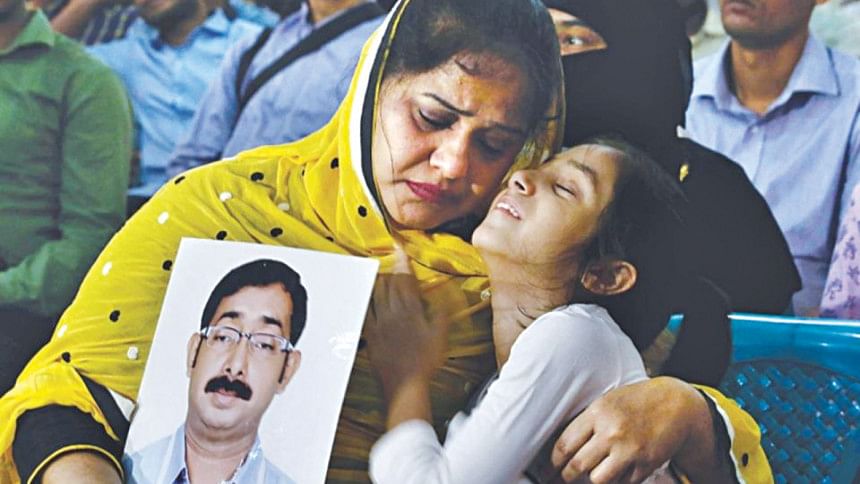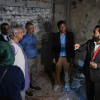A thousand days of wait

Apart from eyes that fight weariness, each of them has one thing in common: they are all waiting for their husbands -- who had gone missing years ago in a notorious spate of enforced disappearances.
Nilufa Yasmin is one of the women. The last conversation she had with her husband Mahfuzur Rahman Sohel, a Chhatra Dal leader in Bangshal, was on December 2, 2013.
He went out of home saying he would bring flowers as it was his son’s birthday. “Tell him [their son] I’m coming back shortly.”
But Sohel never returned. He along with three others were reportedly picked up from the capital’s Shahbagh.
“When we went there [in Shahbagh], some florists told us that the DB men picked them up,” said Nilufa.
Six years on, Nilufa is still waiting for her husband to return. In the meanwhile, their two children are growing up hardly knowing their father.
On numerous occasions, the family members held programmes and appealed to the authorities to bring back the victims. The calls, however, have fallen on deaf ears.
Today is the International Day of the Victims of Enforced Disappearances. The day is observed globally since 2011 to condemn what the United Nations considers “a strategy to spread terror in society”.
Earlier this month, The Daily Star talked to 10 women whose husbands fell victim to enforced disappearance. The picture of hardship is almost the same for all families.
“It’s a very tough time. I have no income. My children are growing up. So is the expense. I can’t afford their tuition fees, nor can I feed them well,” said Nilufa, a housewife at her in-law’s house.
Their son is now a college student and the daughter has just started school.
“Those who don’t have their father supporting them …. their future is uncertain,” she said.
The victims, who went missing in 2013, were mostly involved with the BNP, allegedly picked up days before the 2014 general elections. In all the cases, law enforcers denied having anything to do with their disappearances.
As many as 344 people reportedly became victim of enforced disappearances between 2014 and last month. Forty of them were later found dead, 66 shown arrested in different cases, 35 returned while 203 are still missing, according to rights body Ain o Salish Kendra.
Shammi Sultana, wife of Khalid Hasan, then president of ward-79 Dhaka City unit of Chhatra Dal, said they thought her husband would return after the election ended.
“But that was not to be … then it’s a thousand days of wait,” she said.
The family alleges that Khalid was picked up by plainclothes detectives in front of the gate of old central jail on November 28, 2013.
“My son was just five when his father was taken away. As he started going to school, I knew I have to do something,” Shammi said.
She started a job in 2015 to support the family.
Farzeena Akhter, wife of Parvez Hossain, a Chhatra Dal leader from Bangshal, says she was four months’ pregnant when her husband was “picked up by some plainclothes men” on the night of December 2, 2013.
“My son, who is nearly six-year-old now, has never seen his father’s face,” she along with her daughter and son had been attending programmes over the last few years demanding safe return of Parvez.
Some of the women said living alone in a patriarchal society being a woman is really difficult. Many don’t treat them well.
Wishing not to be named, an NGO official, who maintains close contact with the victim’s families, said two women were married off by their families since there was no trace of their husbands.
Between December 4 and 5 in 2013, eight BNP men, including its Dhaka city ward-38 General Secretary Sajedul Islam Suman, were picked up allegedly by Rab from the capital’s Bashundhara and Shahinbagh areas, say family members while the elite force refutes the allegation.
Minu Akhter’s husband Kawsar Hossain, a private car driver, was among them. With her eight-year-old daughter, Minu now often attends programmes for the victims of enforced disappearance.
“Now my daughter is my strength,” she said.
Coming from a low-income family, Minu fought all alone on the rough path in the last six years.
She believes her husband will come back one day.
Like Minu, mothers, wives and children participated in many press conferences, human chains and rallies and demand the safe return of their loved ones. Hope is what still keeps them going.

 For all latest news, follow The Daily Star's Google News channel.
For all latest news, follow The Daily Star's Google News channel. 








Comments